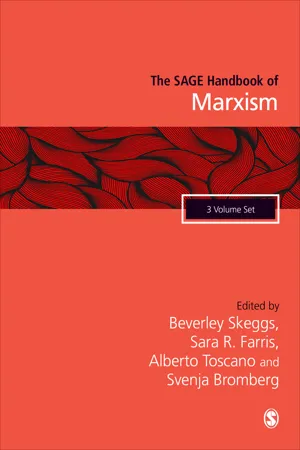
The SAGE Handbook of Marxism
- 1,505 pages
- English
- ePUB (mobile friendly)
- Available on iOS & Android
The SAGE Handbook of Marxism
About this book
The past decade has witnessed a resurgence of interest in Marxism both within and without the academy. Marxian frameworks, concepts and categories continue to be narratively relevant to the features and events of contemporary capitalism. Most crucially, an attention to shifting cultural conditions has lead contemporary researchers to re-confront some classical and essential Marxist concepts, as well as elaborating new critical frameworks for the analysis of capitalism today.
The SAGE Handbook of Marxism showcases this cutting-edge of today's Marxism. It advances the debate with essays that rigorously map and renew the concepts that have provided the groundwork and main currents for Marxist theory, and showcases interventions that set the agenda for Marxist research in the 21st century. A rigorous and challenging collection of scholarship, this book contains a stunning range of contributions from contemporary academics, writers and theorists from around the world and across disciplines, invaluable to scholars and graduate students alike.
Part 1: Reworking the critique of political economy
Part 2: Forms of domination, subjects of struggle
Part 3: Political perspectives
Part 4: Philosophical dimensions
Part 5: Land and existence
Part 6: Domains
Part 7: Inquiries and debates
Frequently asked questions
- Essential is ideal for learners and professionals who enjoy exploring a wide range of subjects. Access the Essential Library with 800,000+ trusted titles and best-sellers across business, personal growth, and the humanities. Includes unlimited reading time and Standard Read Aloud voice.
- Complete: Perfect for advanced learners and researchers needing full, unrestricted access. Unlock 1.4M+ books across hundreds of subjects, including academic and specialized titles. The Complete Plan also includes advanced features like Premium Read Aloud and Research Assistant.
Please note we cannot support devices running on iOS 13 and Android 7 or earlier. Learn more about using the app.
Information
Part I Reworking the Critique of Political Economy
1 Merchant Capitalism
Marx on Merchant's Capital
Table of contents
- Cover
- Half Title
- The SAGE Handbook of Marxism
- Title Page
- Copyright Page
- Contents
- List of Figures
- Notes on the Editors and Contributors
- Introduction: Mapping the Marxist Multiverse
- Part I Reworking the Critique of Political Economy
- 1 Merchant Capitalism
- 2 Mode of Production
- 3 Social Reproduction Feminisms
- 4 Rent
- 5 Value
- 6 Money and Finance
- 7 Labour
- 8 Automation
- 9 Methods
- 10 The Transformation Problem
- PART II Forms of Domination, Subjects of Struggle
- 11 Class
- 12 Punishment
- 13 Race
- 14 Slavery and Capitalism
- 15 Gender
- 16 Servants
- Part III Political Perspectives
- 17 Politics
- 18 Revolution
- 19 State
- 20 Nationalism and the National Question
- 21 Crisis
- 22 Communism
- 23 Imperialism
- Part IV Philosophical Dimensions
- 24 Totality1
- 25 Dialectics
- 26 Time
- 27 Space
- 28 Alienation
- 29 Praxis
- 30 Fetishism
- 31 Ideology-Critique and Ideology-Theory
- 32 Real Abstraction
- 33 Subsumption
- Part V Land and Existence
- 34 Primitive Accumulation, Globalization and Social Reproduction
- 35 Commons
- 36 Extractivism
- 37 Agriculture
- 38 Energy and Value
- 39 Climate Change
- Part VI Domains
- 40 Anthropology
- 41 Art
- 42 Architecture
- 43 Culture
- 44 Literary Criticism1
- 45 Poetics
- 46 Communication
- 47 International Relations
- 48 Law
- 49 Management
- 50 The End of Philosophy
- 51 Technoscience
- 52 Postcolonial Studies
- 53 Psychoanalysis
- 54 Queer Studies
- 55 Sociology and Marxism in the USA
- 56 The University
- Part VII Inquiries and Debates
- 57 Intersectionality
- 58 Black Marxism
- 59 Digitality and Racial Capitalism
- 60 Race, Imperialism and International Development
- 61 Advertising and Race
- 62 Dependency Theory and Indigenous Politics
- 63 The Primitive
- 64 Social Movements
- 65 Riot
- 66 Postsecularism and the Critique of Religion
- 67 Utopia
- 68 Affect
- 69 The Body
- 70 Animals
- 71 Desire
- 72 Filming Capital
- 73 Horror Film
- 74 Three Debates in Marxist Feminism1
- 75 Triple Exploitation, Social Reproduction, and the Agrarian Question in Japan
- 76 Prostitution and Sex Work
- 77 Work
- 78 Domestic Labour and the Production of Labour-Power1
- 79 Logistics
- 80 Labour Struggles in Logistics
- 81 Welfare
- 82 The Urban
- 83 Cognitive Capitalism
- 84 Bio-Cognitive Capitalism
- 85 Intellectual Property
- 86 Deportation
- 87 Borders
- Index